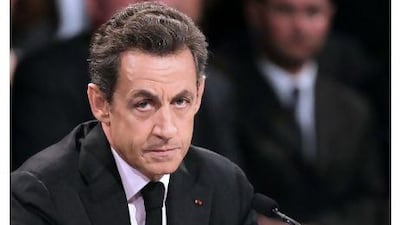ISTANBUL // Nicolas Sarkozy, the French president and one of the country's most vocal and influential critics in its bid to become a member of the European Union, is visiting Ankara today for talks.
It will be the first time since 1980 that Mr Sarkozy has visited Turkey, a country he dislikes so much that his aides once re-routed his plane to spare him the sight of the Eiffel Tower lit up in the colours of the Turkish flag.
The Turkish government is hoping that Mr Sarkozy will soften his position when he sees in person how much Turkey, a rising regional power and the only Muslim EU candidate country, has changed in recent years. But the French president will stay in Ankara for five or six hours only, according to news reports and Turkish diplomats.
Recep Tayyip Erdogan, the Turkish prime minister, said he regretted that Mr Sarkozy did not have more time. "Turkey and Turkish-French ties deserve better than that," Mr Erdogan told Agence France-Presse.
A Turkish diplomat said: "We wish he would stay longer, so he could see more of Turkey, which he probably does not know very well." The last bilateral visit to Turkey by a French president took place almost 20 years ago.
Officially, Mr Sarkozy does not even come as French president, but as the head of the G20 group of the world's major economies, of which Turkey is a member. This is why the trip has officially been downgraded to a working visit, instead of being held at the level of a state visit, the normal protocol for foreign trips of heads of state.
Mr Sarkozy has set himself an ambitious agenda as leader of the G20 and wants to visit all 20 countries that are members. The French president says he wants to move towards a new global monetary system and to take action against rising food prices around the world before his country's presidency ends in November. In his meetings with Abdullah Gul, the Turkish president, and Mr Erdogan, Mr Sarkozy is likely to focus on the G20 agenda instead of going into the thorny issue of Turkey's EU bid.
But Mr Gul and Mr Erdogan are expected to raise the EU question anyway. The Turkish government has become more vocal recently in its criticism of the way its membership negotiations with the EU are proceeding. France is blocking five of the 35 negotiation chapters Ankara has to complete before it can join the union. According to Mr Erdogan, six more are being blocked by Cyprus, and another eight chapters have been put on ice by the EU as a whole because of the unresolved conflict on Cyprus. Turkish diplomats say there is hardly anything left to talk about.
Mr Sarkozy has repeatedly voiced the opinion that Turkey is not part of Europe and should not be allowed to join the EU, saying there are unbridgeable cultural differences. Last year, Wikileaks published a memo by US diplomats in Paris who described how Mr Sarkozy was circling over Paris in his plane one day in 2009 when his advisers suddenly told pilots to change course. They wanted to prevent the president from seeing the Eiffel Tower, which was lit up in the Turkish national colours in honour of a visit by Mr Erdogan.
Other EU countries such as Germany, Austria and the Netherlands are also critical of the Turkish application.
Mr Erdogan, who suspects that some of the resistance is based on religious prejudices, has said the Europeans should say so openly if they do not want the Turks to join and prefer to be a "Christian club". In an AFP interview, he accused the EU of moving the goalposts of the negotiations after talks began in 2005. "They are tiring us", Mr Erdogan said. "But getting tired does not mean that the process" of membership talks "will be stopped".
Ankara says it does not want to do its critics the favour of ending the negotiation process. "We will not be the ones who pull the plug," Egemen Bagis, Turkey's minister in charge of the EU negotiations, said recently.
Confirming that Ankara had decided to harden its rhetoric vis-à-vis the EU, a Turkish diplomat said this step had been taken to make EU leaders aware of the difficulties Turkey is facing with its application.
"We are trying to create some attention, to make them wake up a little," the diplomat said. Mr Erdogan will travel to Germany and Brussels after his meeting with Mr Sarkozy.
Trouble between Turkey and the EU is also brewing on another front. Ankara has been demanding that the EU make it easier for Turks to travel to western European countries. At present, Turks need a visa, which they can get only after a costly procedure widely regarded as humiliating. The EU has scrapped visa requirements for several Balkan states that have not started membership talks with Brussels, but has been reluctant to lower visa requirements for Turkey, a country of 73 million people.

